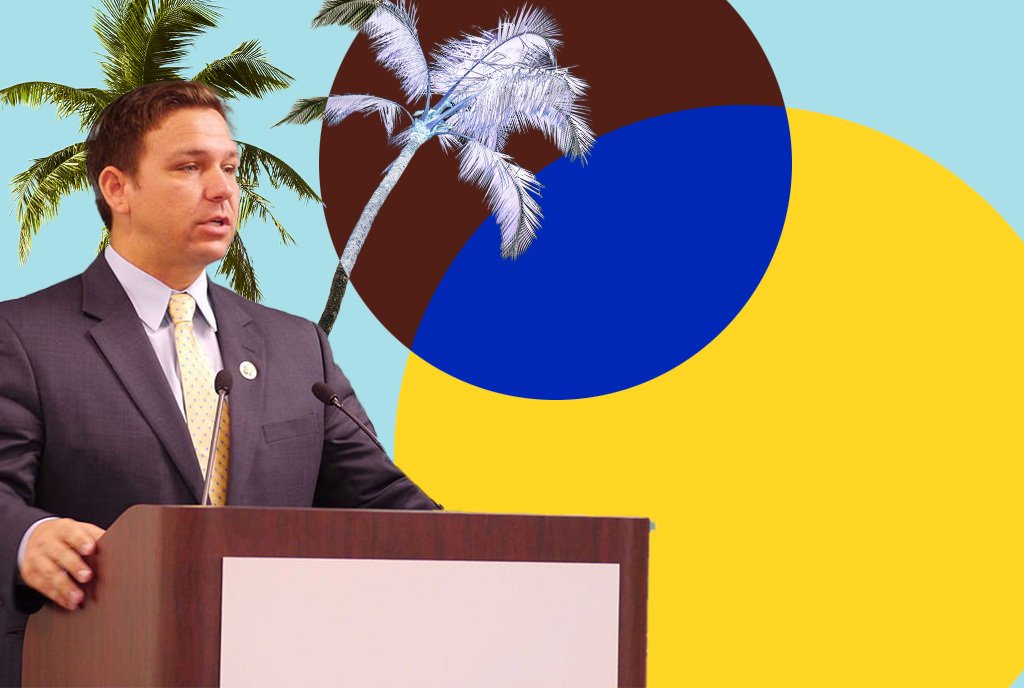
On May 15, 2024, Republican governor Ron DeSantis of Florida—the second-hottest US state behind Hawai’i, which also saw its hottest year since 1985 last year—signed a law that deleted the phrase “climate change” from many of the Sunshine State’s laws. Despite recent survey findings that show that 90 percent of Floridians think that climate change is real and happening (compared to 72 percent of all Americans), the law takes effect July 1.
In addition to ensuring that Florida will no longer have to consider the climate crisis in its energy policies, the bill, along with two others that DeSantis signed the same day, will, according to DeSantis on X, “keep windmills off our beaches, gas in our tanks, and China out of our state” as well as “restore sanity in our approach to energy and [reject] the agenda of the radical green zealots.”
But what the law really does, as explained by the Orlando Sentinel’s Jeffrey Schweers, is “reverse 16 years of state policy, finishing the work started by former Gov. Rick Scott and undoing former Gov. Charlie Crist’s signature piece of environmental legislation.”
Repealing Laws and Ending Programs
Sponsored by state representative Bobby Payne, a Republican from Palatka, House Bill 1645 took a scattershot approach to deleting the phrase “climate change.” In some cases, the words “climate change” were simply deleted from otherwise unaltered sentences. In other instances, entire sections of laws were effectively repealed.
As a result, the bill outlaws offshore wind energy within a mile of the state coastline while encouraging nuclear energy technologies, “a frightening prospect to those who remember nuclear plants at Chernobyl, Three Mile Island and Crystal River,” Schweers writes.
Perhaps most telling is the extent to which the state’s overall mission for approaching the climate crisis was altered.
Where Florida’s energy policy once addressed pollution and climate change, it now focuses on reducing the state’s reliance on foreign energy and strengthening its infrastructure against “natural and manmade threats,” notes NPR.
One highly impacted section has led to the elimination of a state-funded grant program that “helps local governments and school districts reduce greenhouse gas emissions,” writes Emily L. Mahoney of the Tampa Bay Times. It also “preempt[s] local governments’ control over the location of natural gas storage facilities and makes it so state agencies and local governments no longer have to consider fuel efficiency when buying vehicles, among other changes.”
Perhaps most telling is the extent to which the state’s overall mission for approaching the climate crisis was altered. What once read, in part, as an effort to position the state “at the front line against potential impacts of global climate change,” has been replaced with a focus on “an adequate, reliable, and cost-effective supply of energy for the state in a manner that promotes the health and welfare of the public and economic growth.”
Sign up for our free newsletters
Subscribe to NPQ's newsletters to have our top stories delivered directly to your inbox.
By signing up, you agree to our privacy policy and terms of use, and to receive messages from NPQ and our partners.
The new law also limits the ability of utility companies to sell electricity to Floridians who charge electric vehicles at home while increasing protections for gas appliances in homes and reducing the regulation of natural gas pipelines. It removes lines that required state agencies to contract with green hotels for meeting and conference space as well.
“Florida is not an island, its risks have national implications.”
In total, more than 50 lines of state law aimed at mitigating climate change that were enshrined in 2008 were removed.
Protecting Profits, Not People
Yoca Arditi-Rocha, executive director of the Miami-based Cleo Institute, a nonprofit dedicated to improving climate change education, advocacy, and engagement, tells WFSU Public Media that “this purposeful act of cognitive dissonance is proof that the governor and the state Legislature are not acting in the best interests of Floridians, but rather to protect profits for the fossil fuel industry.”
The Nature Conservancy’s Florida director, Greg Knecht, calls the law “very much out of line with public opinion.” State Rep. Randy Fine, a Republican from Palm Bay who owns two electric cars and voted against the bill, tells the Tampa Bay Times that “we can’t set ourselves up to cripple an industry that is coming down the road—and for the record, is generally run by American companies,” speaking about the future of electric vehicles and other green technologies.
“Florida is not an island, its risks have national implications,” writes William S. Becker, a former regional director for the US Department of Energy, in an op-ed in the Hill. “For example, nearly 5 million property owners in the state have filed flood damage claims with the federal government since 2000. As that number grows, all of America’s taxpayers will pay for the downsides of Florida’s climate denial law.”
With sea levels along the Florida coast predicted to rise one to four feet in the next century and with dangerously high temperatures ever increasing, the state is extremely vulnerable to the impacts of climate change, which makes its denial of the phrase all the more troubling.
As Becker puts it, “Maybe Congress should stop rewarding negligence by withholding federal disaster assistance for any state that hides its head in the sand about climate change.”












